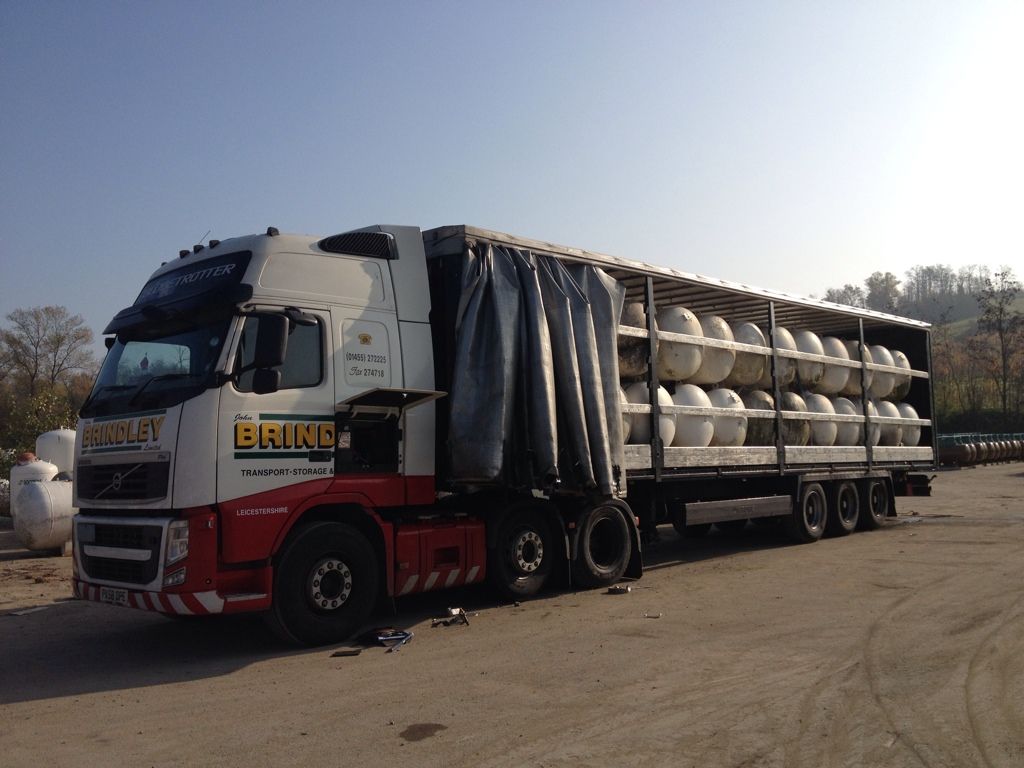CALOR - and it’s transport
Calor Gas developed a Liquefied Petroleum Gas (LPG) business between the years of 1935 and 1939, during the war years the business stagnated and after the war recovery was slow mainly due to the shortage of steel for the manufacture of cylinders. Distribution from the two cylinder filling locations in England was by rail, but the harsh winter of 1947 when the railways came to a halt, caused Calor to adopt an alternative, which was road haulage. A road transport company named PX Carriers (owned by the Peck family) was engaged as the sole National carrier for Calor Gas. Pecks Transport was founded by Arthur Peck in Wollaston, in 1896, much of their business was moving goods for the shoe trade, the company name was changed to PX Ltd in 1934.
With the association of PX with Calor, two new Companies were formed, Transport Consultants, and Vehicle Hire and Supply, the former undertaking organisational detail, and the latter vehicle acquisition, operation and maintenance. The Head Office of these two companies was at Higham Road, Rushden, where excessive vehicle workshops allowed for customisation to suit Calor’s needs. 75 Leyland Lynx vehicles were purchased from RAF surplus disposals, stripped down, and fitted with suitable bodies which would be the backbone of the Calor fleet. Calor Transport was born.
As the number of Calor sites increased Nationally so did the size and make up of the vehicle fleet. From the original 75 of 1947/8, there were 262 powered units and 179 semi trailers in 1962, with orders for more semi trailer LPG tankers in the pipe line. The Peck family completed an amalgamation of the Companies in 1957 and took full control. LPGAS (Liquefied Petroleum Gas Ancillary Services) was the new name to replace Transport Consultants and Vehicle Hire and Supply. As more work was being undertaken on behalf of Gas Boards, Oil Companies and Chemical companies this was a rational option. In 1963 the fleet had grown to 328 motive units including 156 pressure tankers.
Calor diversified and moved into third party transportation in a big way in 1966 with the acquisition of Monks International and Monkton Motors which added 67 vehicles and two depots at Uxbridge and Widnes, as well as Chemical and Gas Transport NV in Utrecht (Holland), and their sister company in Germany, with bases in Gelsenkirchen, Lunen, Wesseling, Hamburg, Koln, Frankfurt and Monheim, as well as Transportes Quimicos International SA, based in Madrid, Barcelona, and Seville. Calor’s expertise was renowned, and in 1963 a Russian export order was shipped that included 5 filling stations and 10 road tankers. In 1965 further expansion in Germany with the acquisition of Becker and Pickhaus and a name change to Calor.
In 1970 control of Calor was purchased by Imperial Continental Gas and the business restructured, giving third party pressure transport the name of Chemical and Gas Transport, and leaving Monkton Motors independant with 267 vehicles, the European transport was controlled by International Division¸ under the name of Calor Transport International. In tandem with this a controlling share of Transport Coulier (Belgium) was undertaken, with retention of the full management team. In 1971 Calor acquired Kosangas in Southern Ireland giving full cover on the island, also in order to simplify management structure and scales of economy all drivers were transferred to Calor Gas along with all vehicle licences, and on 1st October, Monkton Motors and the transport division of Calor Gas were integrated as Calor Transport with a new corporate logo. On 1st April 1972, Tyburn Road Tank Services were acquired from Powell Duffryn adding over 100 tankers to the fleet. Monks International were finding it difficult to obtain permits for through France movements and were only managing to keep going, and was integrated into Calor Transport, their movements being co-ordinated through the Rotterdam office. The Spanish businesses were disposed of, and the LPG fleet of British Oxygen Company (BOC) was purchased.
1977 saw the acquisition of WH Palmer(Bulk Liquids) and Arrow Bulk Carriers, the former bringing ATW (Authorised Tank Wagons) for bonded cargoes, and the latter latex and other allied chemical products, but also a depot at Hull with opening the UK — Europe route. Calor Transport was now the major specialist road transport organisation in Britain. In 1978 Calor Transport International in Germany was sold, and over £1.22m of capital expenditure on Transport Coulier for expansion. In 1981 Calor acquired the ex Pointer Transport tanker fleet from Mitchell Cotts based at Kings Lynn.
1983 accounts stated that Calor Transport returned an operating loss for the first time, and its 26 operating depots were subject to a review. 1986 Batley based LPG Transport was acquired and run parallel with Calor Transport, at this time there were nearly one thousand transport staff employed.
In 1988 Dutch company SHV which has a world wide portfolio in LPG staked an interest in Calor, and in 1992 had full control. In 1997 Calor became a wholly owned company within the SHV Energy Group. Transport Coulier was subject to a management buy-out.
It was found that the struggle for capital became a priority for the core business, and decisions were made which would mean the slow reduction of Calor Transport. LPG Transport was sold to TDG before any integration, and Calor Transport contracts were not renewed. By 2000 only a handful of vehicles were operating and by 2006 third party haulage ceased to exist. Calor Gas, however, still has a very large and well kept fleet transporting and delivering their gas.











